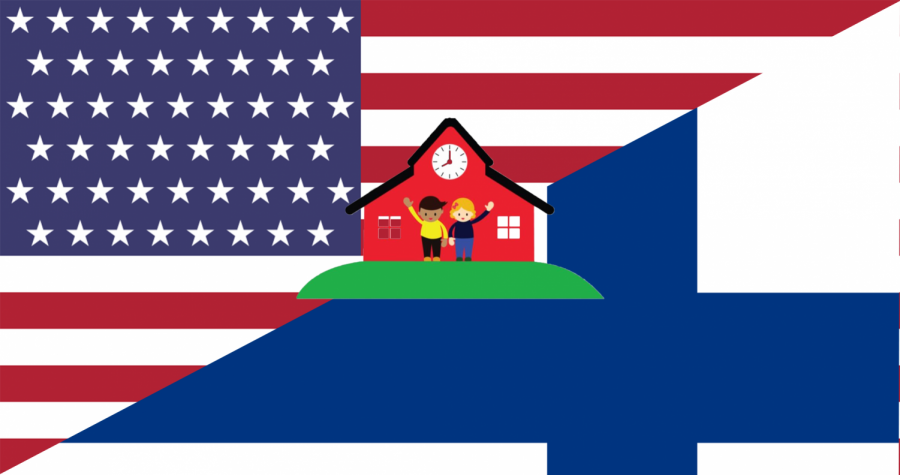How The U.S. Ranks In Education Compared To Other Countries
U.S vs. Finland, photo. The education in other countries compared to America.
September 25, 2019
The United States of America, a world-wide superpower, sets an example of innovation globally. However, the U.S is ranked 17th out of 40 in education. Maybe this shocks you, but being a student at a public high school in America, it probably doesn’t. There are fundamental systematic flaws in the system of education nationally. Look to some of the top ranked countries in education, such as Finland, Norway or Sweden,what are they doing that we aren’t?
Finland is currently ranked number one in education. Acorrding to The Independent, in Finland, school starts at age seven, giving kids time to cultivate creativity before being forced into a box of restraints and deadlines at such a young age. The idea of going to college, potentially putting yourself in lots of debt, for an education that isn’t necessary for what you want to do with your life, isn’t advertised as the only way to be successful. After age 16 you can choose to proceed with a traditional education or to go to a three-year vocational school instead. Finland school days are significantly shorter, with longer breaks throughout the day. The classes are all longer, similar to what we call block days. Some teachers teach the same students for up to six years, therefore cultivating individual and meaningful relationships with students. Finland has the least homework in the world, most students barely have 30 minutes a night. There are barely any standardized testing. There is no tracking or gifted sections, every class is combined with all kinds of kids, this way everyone can rise to their own level and their potential isn’t stopped. Finland creates an enjoyable environment to learn, and it’s working. The results are indisputable.
There are many different types of learners, and in America the system is only designed to teach to one kind of intelligence. In America, children are separated and tracked into gifted and not sections, high-achieving and failing schools both seem to be centered on national testing, which causes schools and students high levels of stress. We are expected to participate in an array of extra-curriculars, to be competitive for good colleges. Good grades alone won’t cut it, but we barely have time for all our homework and studying. A student said this:
“An earlier ending to school can give students more time for extracurricular activities. As
an athlete I was surprised last year on how full my schedule was. I was off to school straight away in the morning and didn’t get home after practice until about 6:30. Then i only had adequate time to shower, eat, and do homework before I was completely exhausted. The school and sport part of my days could be much more effective if I could focus on them without being on a tight schedule.”
Standardized tests like S.O.L.’s are stressful and time consuming, but the data is actually very important to address racial or socio-economic divides in learning targets. Dr. I helps explain phenomenon by giving some historical context.
“George W. Bush came out with No Child Left Behind, and it was really to address the achievement gaps between black and brown, and poor students, and white students and, Asian students. It was an accountability measure, but with those accountability measures came a lot of assessments… The positive behind it did shine a light on inequities in student achievement across the nation.”
It seems ridiculous that in elementary school your whole track of education is decided. You are put into these boxes, and after a certain point you can’t rise above your group. By tracking kids, you’re limiting their potential growth. The higher classes aren’t even necessarily harder, here is what one student says: “Harder classes don’t usually mean more thinking, they mean more homework.”
The gifted program is flawed fundamentally, and it is also not diverse at all. The programs offered to children who exceed the average is also one-dimensional and only open to one type of intelligence. The gifted program should acknowledge and account for different types of intelligence and learning.
Some conditions are jail-like, it seems to me we would produce overall happier and healthier students by making some simple changes, such as longer lunches and breaks, less homework, and the ability to go to the bathroom without a pass. Dr. I said he would be open to discussing and hearing student input on how to install more “free time” or “mindfulness breaks” into our school day.
Although the education system is flawed, and many changes for our school are locked down by federal regulations, there is hope. Change comes from within. Our school is filled with individuals who want to innovate and make positive changes in our school. Contentedness is the enemy of progress. By constantly looking for ways to improve our school and acting on your ideas can change things. Dr. I is a great resource, he is receptive to new ideas and shows genuine interest in collaborating with students. It may seem idealistic but your ideas can become a reality in our school.






